The controversy over Sant Rampal and his army of followers taking the law into their hands has once again thrown the spotlight on the clout that India's godmen possess.
Though health, well-being and spirituality are what they all profess, some have made it to the headlines for the controversy they create, like financial irregularities, sexual abuse and, sometimes, even murder.
Rediff.com takes a look at few of these gurus who have attracted controversy in recent times. We start off with Sant Rampal himself.
Sant Rampal, as he is called by his followers set up Satlok Ashram in 1999 after he came in contact with a seer named Ramdevanand. Soon, he had a number of followers and began opening ashrams all over Haryana.
The 63-year-old engineer, today, owns a fleet of luxury cars, and lives in an ashram in Barwala, Haryana, spread over a sprawling 12 acres.
His legal woes began in 2006 when he clashed with supporters of Arya Samaj founder Swami Dayanand Saraswati, which led to the death of one person.
Since then, Rampal, who faces contempt of court, murder and attempt to murder cases in various courts, has skipped hearings 42 times.
Rampal is said to have over 25 lakh followers in Haryana, Uttar Pradesh, Rajasthan, Madhya Pradesh, Punjab and Delhi and has his own Facebook and YouTube page too, with a huge fan following.
For the last 10 days, Rampal’s ashram has witnessed violent clashes as his supporters have been refusing the police entry into the guarded fortress, which also led to the deaths of six devotees.
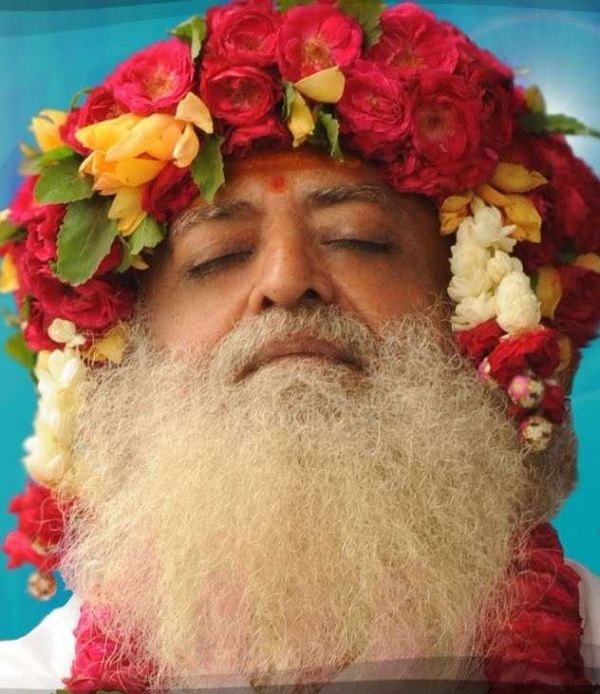
Born in Sind in undivided India, today Asaram Bapu has over 425 ashrams and more than 50 gurukuls all over, and a tremendous following both in India and aboard.
Spirituality aside, he has also been courting controversy.
Controversies:
1: Asaram was accused of sexually abusing a 16-year-old girl at his Jodhpur ashram even as her mother was waiting outside. He was served a summons in the case by the Jodhpur police at his ashram in Indore. The police had earlier served a summons to his officials at his Ahmedabad ashram. The godman claimed he was innocent and regards the minor as his "daughter".
2: Commenting on the December 16 Delhi gang rape incident, Asaram suggested that the victim was equally responsible for the crime. He said the girl could have called her assailants brothers and begged them to stop. His comments invited sharp criticism from across the political spectrum and from women's activists.
3: The ministry of corporate affairs said it had received complaints against him and his son in an alleged 700-acre land-grabbing case and the serious frauds investigation office is looking into the matter.
4: Asaram and his son were also investigated in the mysterious deaths of two boys whose decomposed bodies were found from the banks of Sabarmati River near his ashram in 2008.
Swami Nithyananda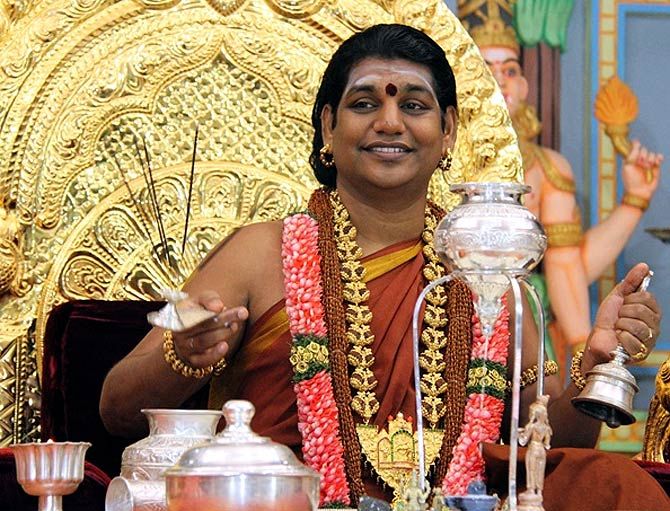
Popular for his spiritual discourses and meditation programmes, Swami Nithyananda was named as one of the 100 most spiritually influential living people in the world by Watkins’Mind Body Spirit magazine.
He claims to be the most-watched spiritual teacher on YouTube.com with more than 14 million views, and the author of more than 300 books published in 27 languages.
Controversies:
1: Nithyananda landed in a controversy after a purported video footage showing him in a compromising position with an actress was telecast by local TV channels. Nithyananda said the video was morphed and manipulated to misrepresent his personal life but did not deny his images with actress Ranjita in the film.
The video aired on Tamil TV channels caused a furore, with some Hindu groups and others protesting against Nithyananda. The Karnataka government too promised "very strict" action against him.
Lenin Karuppan, who had exposed the alleged sex scandal, was arrested after a complaint by the manager of Nithyananda's ashram that Lenin had demanded money to keep the video secret.
2: Swami Nithyananda was also accused of rape by Indian-born American citizen, Arthi Rao, in June 2012. Rao went on Indian television accusing Nithyananda of raping her for several years. Nithyananda again denied the allegations.
Baba Ramdev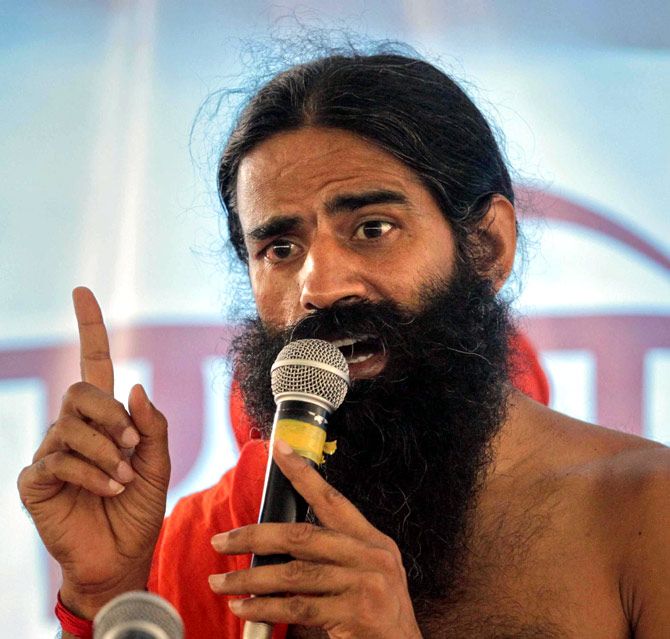
Baba Ramdev is best known for popularising yoga and has been very vocal about political issues in the country.
Who can forget the Delhi government’s crackdown on his agitation at the Ramlila maidan in June 2011, where the baba tried to hoodwink the police by wearing salwar kameez and dupattaafter they cracked down on the fast against corruption.
Controversies:
1: Tehelka magazine had reported financial irregularities and tax evasion by Ramdev's trusts. Irregularities included sales tax evasion, forceful land grab from farmers and stealing of electricity by using agricultural connection for commercial use.
2: Senior leader of the Communist Party of India-Marxist Brinda Karat accused the Divya Pharmacy, owned by Ramdev's Divya Yog Mandir Trust, of using human and animal bones in their medicines.
3: The yoga guru has claimed that regular practice pranayama popularised by him has successfully 'cured' cancer within six to nine months. Cancer of the breast, liver, prostate, uterus, pituitary gland, brain tumour and even leukaemia, can be cured by practising the breathing exercises, he claimed.
4: Ramdev has suggested that yoga was the way to prevent and cure AIDS. "We will prove through clinical tests that yoga can cure AIDS. We will offer the cure shortly, in the next couple of years," Ramdev had said.
"Sex education in schools need to be replaced by yoga education," Ramdev also told reporters. "The government should stop polluting the minds of innocent young children with sex education. Society's morality cannot improve with teaching sex education in schools. And AIDS cannot be prevented by talking free sex and by using condoms."
5: Ramdev has contended that homosexuality is a disease that is curable through yogic practices. "It can be treated like any other congenital defect. Such tendencies can be treated by yoga, pranayama and other meditation techniques," he said in a petition to the court.
Swami Agnivesh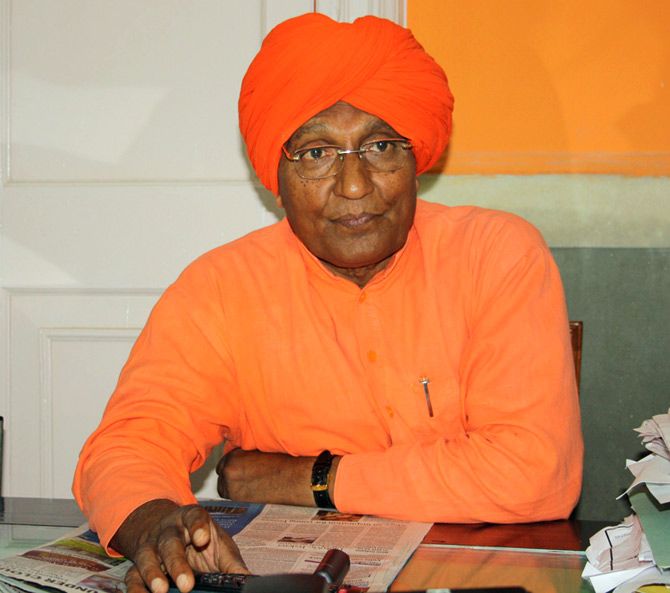
An Arya Samaj scholar and social activist, Swami Agnivesh is a former member of legislative assembly from Haryana. In 2011, Agnivesh spent three days inside the Bigg Boss house as a guest, to "use this opportunity to promote and create awareness on social issues including corruption".
Agnivesh joined ‘Team Anna Hazare’ in the anti-corruption protests in August 2011. However, he broke away from the main group claiming that other protesters humiliated and conspired against him.
Controversy:
1: Swami Agnivesh came under attack during the August 2011 anti-corruption protests over a controversial video posted on YouTube where he is purportedly telling a person alleged to be a Union minister that the government act tough with the fasting Gandhian (Anna Hazare).
Agnivesh on his part claimed the video footage was "doctored and concocted" and part of a smear campaign against him. He denied talking to Union Minister Kapil Sibal who was involved in negotiations during the initial stages of the stand-off between Team Anna and the government.
2: Swami Agnivesh’s unexceptionable statement that he supported the entry of non-Hindus into the Jagannath Temple at Puri, however raised the hackles of Hindu priests. Priests of the temple condemned his remarks as ‘purely anti-Hindu in nature’ and burned his effigy.
3: Agnivesh, during a trip to Jammu, had allegedly said that he "does not understand why people go" for Amarnath yatra and such pilgrimages and had termed the "Shivlingam" that forms inside the Amarnath cave shrine a geographical phenomenon. The Supreme Court condemned Agnivesh for hurting the sentiments of Hindus. “You cannot take sentiments of the people for granted," the bench said, noting that a large number of people go on Amarnath yatra every year.
Rajneesh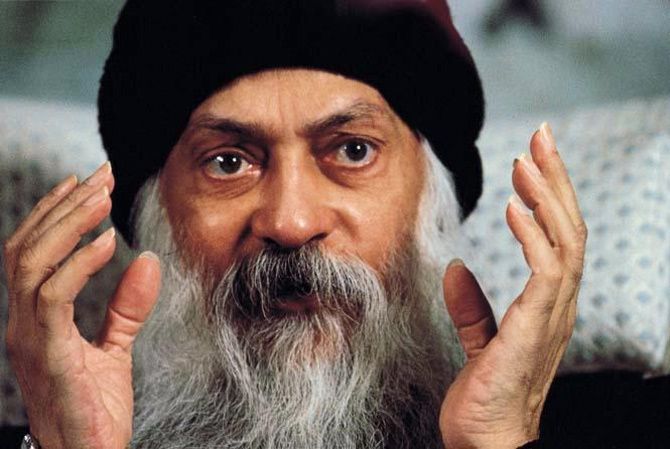
Considered one of the most controversial spiritual leaders to have emerged from India during the 20th century, Rajneesh or Osho was outspoken in his criticism of socialism, Mahatma Gandhi and institutionalised religion.
He advocated a more open attitude towards sexuality, which earned him the sobriquet of "sex guru".
Rajneesh discouraged marriage and having children. He saw families as prone to dysfunction. His communes in Oregon and England accepted contraception, sterilisation, and abortion.
A former personal secretary, Ma Anand Sheela, of the controversial spiritual guru in a bare-all memoir said that “Osho Rajneesh disregarded all laws, ethics and legalities as he wanted to create a society of his own vision with its own laws and rules.” Rajneesh had once, out of the blue, demanded to get him 30 new Rolls-Royces within one month in spite of already possessing 96 brand new Rolls-Royces.
The 1984 Rajneeshee bioterror attack was the first bioterrorist attack in United States history. Around 751 individuals were poisoned through the deliberate contamination of salad bars at ten local restaurants in Oregon with salmonella.
The attack was orchestrated by followers of Rajneesh to rig the election so that their own candidates would win the 1984 Wasco County elections.
In 1985 high-ranking followers of Rajneesh hatched a conspiracy to assassinate then United States Attorney for the District of Oregon Charles Turner. However, the plot was never carried out and was only discovered later during investigations into the bioterror attack and other illegal acts by the Rajneeshpuram leadership.
Popular Bollywood personalities who were part of the Rajneesh movement include Parveen Babi, who joined the movement in mid-1970s along with her then boyfriend, producer Mahesh Bhatt.
Film star Vinod Khanna became a sannyasi on December 31, 1975, and received the name Swami Vinod Bharti. He was Osho's gardener at Rajneeshpuram.
Controversies:
1: Increased criticism of his activities at the Pune ashram in 1981 and threats of punitive action by authorities led Rajneesh to move to the United States. However, his Oregon commune collapsed in 1985 when Rajneesh revealed that the commune leadership had committed serious crimes. He was charged with immigration violations and deported.
2: At the Second World Hindu Conference in 1969 he came under criticism when he claimed "any religion which considers life meaningless and full of misery, and teaches the hatred of life, is not a true religion. Religion is an art that shows how to enjoy life."
3: Not only was his therapies questioned, there were allegations of drug use among sannyasins.
Chandraswami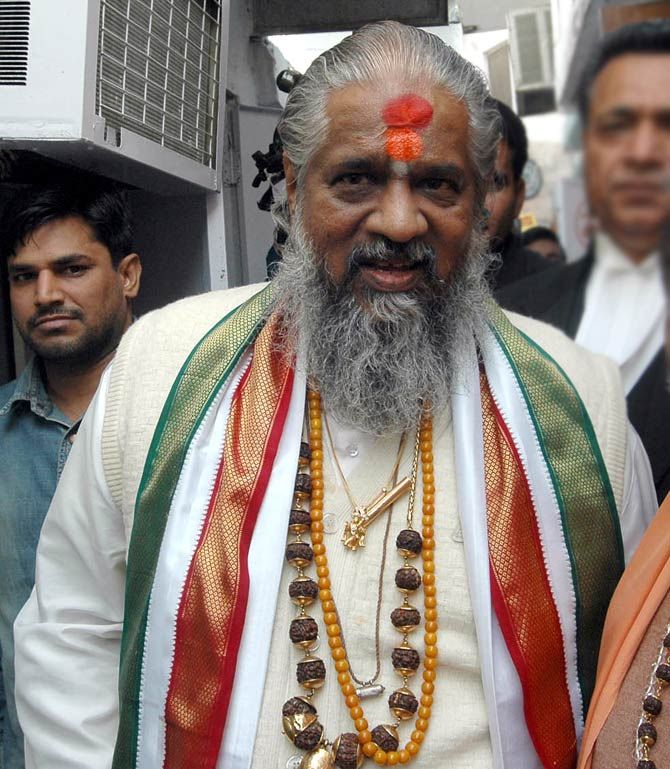
His association with former Prime Minister PV Narasimha Rao brought Chandraswami -- the controversial tantrik -- into prominence.
Interestingly, the godman’s finances have fluctuated with his political fortunes.
Controversies:
1: Chandraswami has been accused of several financial irregularities and was ordered by the Supreme Court to pay a penalty in several Foreign Exchange Management Act violation cases registered by the enforcement directorate. The ED has imposed a total penalty of Rs 9 crore (approx) on Chandraswami in 13 cases of Foreign Exchange Regulation Act violations for acquiring foreign exchange in contravention of the Act.
2: In 1996, he was arrested on charges of defrauding a London-based businessman of $100,000.
3: The CBI has been investigating the suspected role of the self-styled godman in the Rajiv Gandhi assassination case. The Jain Commission dedicated a volume to his alleged involvement in the assassination. The Enforcement Directorate is still investigating his alleged role as financier in the killing.
Jayendra Saraswati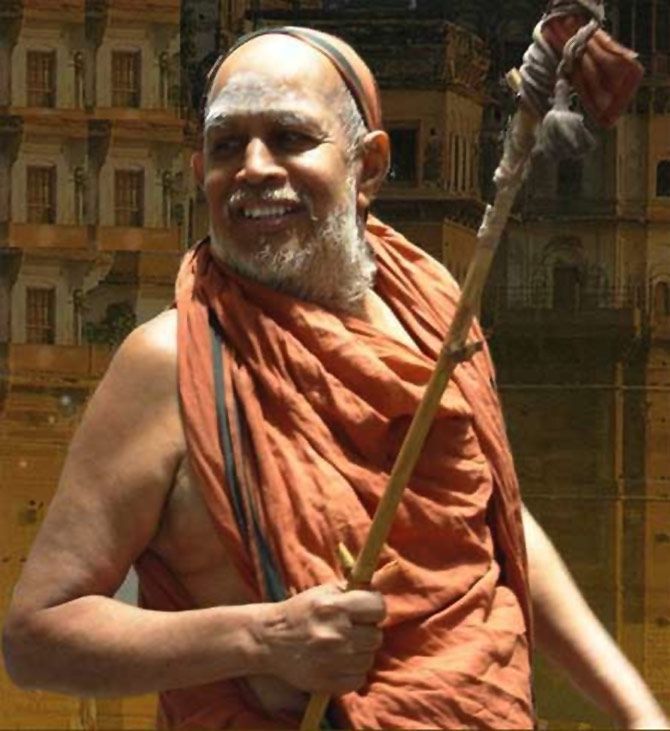
Jayendra Saraswati is the sixty-ninth Shankaracharya of the Kanchi Kamakoti Peetham. Keeping with the Shankaracharya's oft-expressed concerns the Jayalalithaa government in Tamil Nadu enacted a law to ban religious conversions and enforced a ban on animal sacrifice in temples.
The Shankaracharya attracted controversy when he left his mutt in 1987 during the Chaturmasya vrata and was not traceable for a few weeks.
Controversies:
1: Kanchi seer Jayendra Saraswati and his junior Vijayendra are the prime accused in the murder of Sankararaman, the manager of the Varadarajaperumal temple at Kanchipuram, in September 3, 2004.
The two seers have been charged under IPC sections for criminal conspiracy and murder. The trial in the case was shifted to Puducherry from Chengalpattu by an order of the Supreme Court on a petition Jayendra had filed before it on October 25, 2005.
2: Another 'attempt-to-murder' case was filed by an auditor, Radhakrishnan, in Chennai. He alleged that Jayendra Saraswathi sent goons to his house to kill him because he had questioned the missing 83 kg of gold meant for the Kamakshi temple at Kanchipuram.
Gurmeet Ram Rahim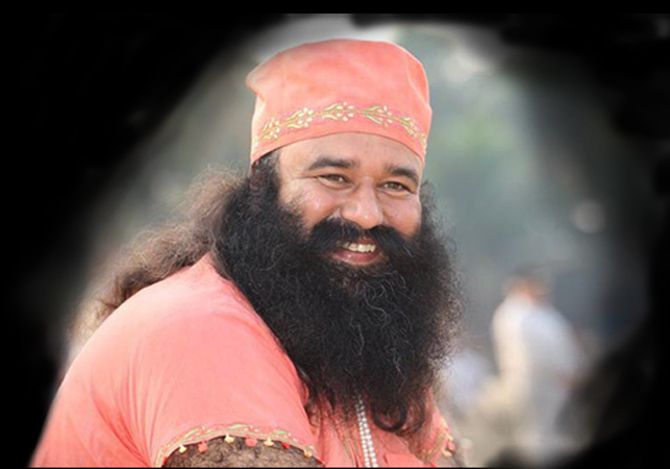
Leader of the Dera Sacha Sauda, a socio-spiritual orgnisation, Gurmeet Ram Rahim has led his organisation to several Guinness World Records.
The Dera Sacha Sauda head was in the news recently for announcing that that nearly 1,500 followers of the sect were ready to marry the Uttarakhand women who lost their husbands in the flash floods and landslides that struck the hill state.
The spiritual leader and preacher has, in association with the American Society of Echocardiography, created a world record for most cardiac echo tests.
Controversies:
1: Public prosecutor Ujjwal Nikam submitted that during the visit of Dera Sacha Sauda chief Baba Gurmit Ram Rahim Singh on June 25, 2008, his personal bodyguards had allegedly fired at a crowd at Nirmal Lifestyle mall in suburban Mulund, Mumbai, in which Balkar Singh, a Sikh, was killed. Citing lack of evidence, a fast track court acquitted 14 volunteers of Dera Sacha Sauda, in the case.
2: The Dera Sacha Sauda chief set off a controversy when he appeared in attire similar to the one worn by the tenth Sikh guru, Guru Gobind Singh, and distributed amrit (nectar) to his followers at his Dera in Sirsa.
3: The Punjab and Haryana high court issued a notice of motion to the Dera Sacha Sauda head Gurmit Ram Rahim Singh of Sirsa seeking explanation for the allegations made against him by his follower for sexually exploiting his wife.
4: A Tehelka investigation alleged that the Dera Sacha Sauda is a den of vice and accused Baba Gurmeet Singh of rape and murder.
Sathya Sai Baba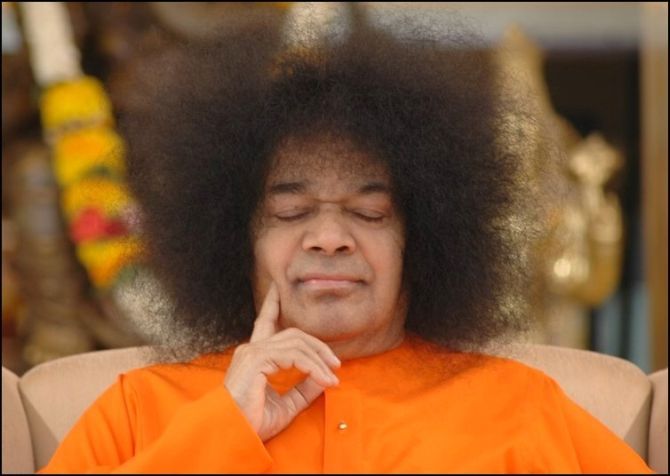
The list will remain incomplete without a mention of Sathya Sai Baba of Puttaparthi, probably the most famous guru with millions of followers across 126 countries.
Often regarded as ‘Bhagwan’, Sathya Sai Baba, who passed away in 2011, ruled the hearts of his devotees through many social service endeavours like building multi-specialty hospitals providing free treatment, schools and colleges among others.
However, his life and times were also marked by several serious controversies involving allegations of faking ‘miracles’, sexual abuse and even pedophilia -- all of them vociferously refuted by his followers.
Sai Baba has often been charged, both nationally and internationally, over the veracity of his ‘miracles’ -- be it producing holy ash or vibhuti, gold ornaments and rings from thin air -- by his critics. Skeptics and rationalists have alleged from time to time that his miracles ‘were simple magic tricks to woo his devotees’. Nevertheless, such allegations, although never taken on directly by the Baba, have not dented the faith of his followers.
There have also been allegations, sometimes by former followers, that Sai Baba used to indulge in sexual abuses and pedophilia. However, the allegations have never been proven.
The biggest ever controversy to have haunted Sathya Sai Baba’s Puttaparthy ashram Prashanti Nilayam was on June 6 1993, when four persons were shot dead by the police after they had allegedly stabbed four devotees in Baba's bedroom, killing two and serious injuring the other two.
There also have been allegations of misappropriation of funds in the name of donations in running the Rs 40,000 crore Sathya Sai Baba trust. Moreover, even after the Baba’s demise, trustees found cash of Rs 11.5 crore, 98 kg of gold and silver articles weighing 307 kilograms from his private room, which again raised eyebrows. The money and valuables took 36 hours to be counted.










